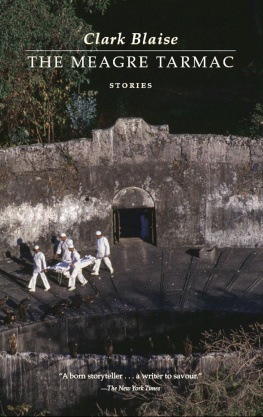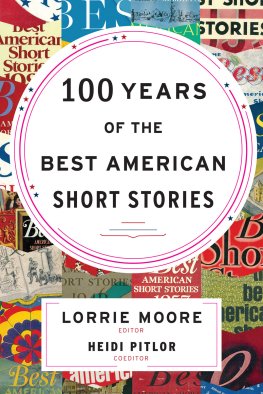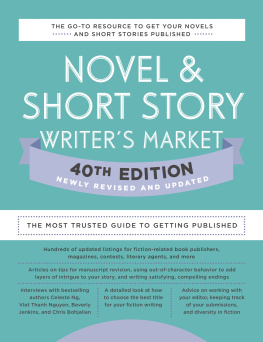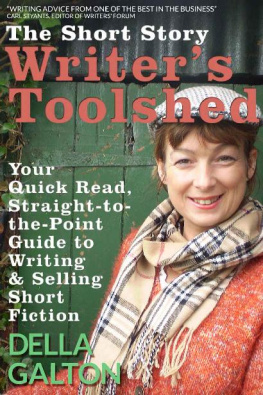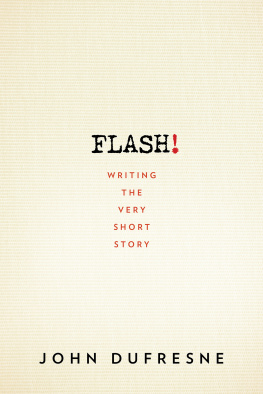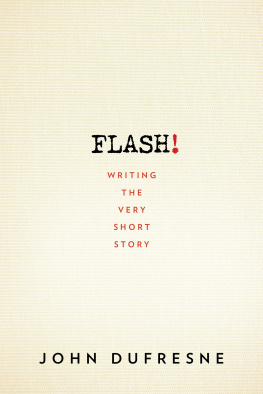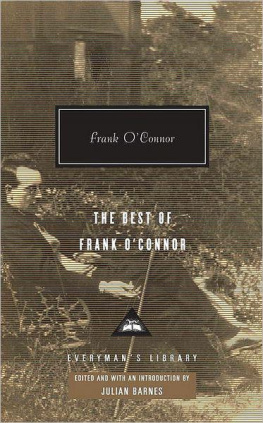THE MEAGRE TARMAC
CLARK BLAISE
THE MEAGRE TARMAC
STORIES
BIBLIOASIS
Copyright Clark Blaise, 2011
All rights reserved. No part of this publication may be reproduced or transmitted in any form or by any means, electronic or mechanical, including photocopying, recording, or any information storage and retrieval system, without permission in writing from the publisher.
FIRST EDITION
Library and Archives Canada Cataloguing in Publication
Blaise, Clark, 1940
The meagre tarmac / Clark Blaise.
Short stories.
ISBN 978-1-926845-15-9
I. Title.
PS8553.L34M42 2011 C813.54 C2011-900983-8

We gratefully acknowledge the support of the Canada Council for the Arts, Canadian Heritage, and the Ontario Arts Council for our publishing program.
PRINTED AND BOUND IN CANADA
To my Granddaughter, Priya Blaise
For fifty years of guidance, all my Indian friends,
and of course my wife, Bharati.
THE SOCIOLOGY OF LOVE
A MONSTROUSLY TALL GIRL from Stanford with bright yellow hair comes to the door and asks if I am willing to answer questions for her sociology class. She knows my name, Dr. Vivek Waldekar? and even folds her hands in a creditable namaste. She has researched me, she knows my job-title and that I am an American citizen. Shes wearing shorts and a midriff-baring T-shirt with a boastful logo. It reads, All This and Brains, Too . She reminds me of an American movie star whose name I dont recall, or the California Girl from an old song, as I had imagined her. I invite her in. Ive never felt so much the South Asian man: fine-boned, almost dainty, and timid. My wife, Krithika, stares silently for several long moments, then puts tea water on.
Her name is Anya. She was born in Russia, she says. She has Russian features, as I understand them, a slight tilt to her cheeks but with light blue eyes and corn-yellow hair. When I walk behind her, I notice the top of an elaborate tattoo reaching up from underneath. She is a walking billboard of availability. She says she wants my advice, or my answers, as a successful South Asian immigrant on problems of adjustment and assimilation. She says that questions of accommodation to the u.s., especially to California, speak to her. And specifically South Asians, her honors project, since we lack the demographic residential densities of other Asians, or of Hispanics. We are sociological anomalies.
It is important to establish control early. It is true, I say, we do not swarm like bees in a hive. Why do you criticize us for living like Americans? I ask, and she apologizes for the tone of her question. I press on. What is it we lack? Why do you people think there is something wrong with the way we live?
She says, I never suggested anything was wrong She drops her eyes and reads from her notes.
That theres something defective in our lives?
Please, Im so sorry.
I have no handkerchief to offer.
Perhaps we have memories of overcrowded India, when everyone knew your business. I know where her question is headed: middle-class Indian immigrants do not build little Chinatowns or barrios because we are too arrogant, too materialist, and our caste and regional and religious and linguistic rivalries pull us in too many directions. She hangs her head even before asking the next question.
No, I say, there are no other South Asian families on my street. My next door neighbours are European, by which I mean nonspecifically white. I correct myself. European is an old word from my fathers India, where even Americans could be European. Across the street are Chinese, behind us a Korean.
Thats why Im involved in sociology, she says, its so exciting. Sociology alone can answer the big questions, like where are we headed and what is to become of us? I offer a counter-argument; perhaps computer science, or molecular biology, or astronomy, I say, might answer even larger questions. In the here and now, she insists, there is only sociology. She is too large to argue with. She apologizes for having taken my name from the internal directory of the software company I work for. Shed been an intern last summer in our San Francisco office.
I say I am flattered to be asked big questions, since most days I am steeped in micro-minutiae. Literally: nanotechnology. I can feel Krithikas eyes burning through me.
The following are my answers to her early questions: We have been in San Jose nearly eight years. I am an American citizen, which is the reason I feel safe answering questions that could be interpreted by more recent immigrants as intrusive. We have been married twenty years, with two children. Our daughter Pramila was born in Stanford University Hospital. Our son Jay was born in JJ Hospital, Bombay, seventeen years ago. When he was born I was already in California, finishing my degree and then finding a job and a house. My parents have passed away; I have an older brother, and several cousins in India, as well as Canada and the U.S. My graduate work took four years, during which time I did not see Krithika or my son. Jay and Krithika are still Indian citizens, although my wife holds the Green Card and works as a special assistant in Stanford Medical School Library. She will keep her Indian citizenship in the event of inheritance issues in India.
Do I feel my life is satisfactory, are the goals I set long ago being met? Anya is very persistent, and I have never been questioned by such a blue-eyed person. It is a form of hypnosis, I fear. I am satisfied with my life, most definitely. I can say with pride and perhaps a touch of vanity that we have preserved the best of India in our family. I have seen what this country can do, and I have fought it with every fibre of my being. I have not always been successful. The years are brief, and the forces of dissolution are strong.
Jay in particular is thriving. He has won two Junior Tennis Champion ships and maintains decent grades in a very demanding high school filled with the sons and daughters of computer engineers and Stanford professors. As a boy in Dadar, part of Bombay sorry, Mumbai I was much like him, except that my father could not offer access to top-flight tennis coaching. I lost a match to Sanjay Prabhakar, who went on to the Davis Cup. How will I be worthy? I had asked my father before going in. You will never be worthy of Sanjay Prabhakar, he said. It is your fate. You are good, but he is better and he will always be better. It is not a question of moral worth. I sold my racquet that day and have never played another set of tennis, even though even now I know I could rise to the top of my club ranks. I might even be able to beat my son, but I worry what that might do to him. I was forced to concentrate on academic accomplishment. In addition, public courts and available equipment in India twenty-five years ago left much to be desired.
Do I have many American friends? Of course. My closest friend is Al Wong, a Stanford classmate, now working in Cupertino. We socialize with Al and Mitzie at least twice a month. She means white Americans. Like yourself ? I ask, and she answers not quite. She means two-three-generation white Americans. Such people exist on our street, of course, and in our office, and I am on friendly terms with all of them. I tell her I have never felt myself the victim of any racial incident, and she says, I didnt mean that. I mean instances of friendship, enduring bonds, non-professional alliances ... you know, friendship. You mean hobbies? I ask. The Americans seem to have many hobbies I cannot fully appreciate. They follow the sports teams, they go fishing and sailing and skiing.

